The fourth installment of Creative Convergence Silicon Valley (C2SV) kicked off Thursday at the California Theatre in San Jose’s SoFA District, and the collective message was one of optimism despite despite a host of systematic obstacles to overcome.
Dan Pulcrano, Metro’s executive editor, delivered welcoming remarks before three speaker sessions. Below is a recap of some of the events.
Elephant in the Valley
Silicon Valley’s lack of female and minority representation has long been an open secret. In recent years, though, gender bias has been confirmed by government data and litigation (such as the lawsuit between Ellen Pao and Kleiner Perkins, to name the most prominent example). But the data remained fragmented.
That’s why a survey published this past spring, quantifying the extent of gender bias in the innovation economy, was hailed as a landmark. The report, titled “Elephant in the Valley,” painted a picture of discrimination in real numbers.
The survey’s co-authors Michele Madansky and Hillary Mickell, as well as author and cultural innovator Lisen Stromberg, held a panel discussion at Thursday’s C2SV tech conference about how to “slay the dragon” of misogyny in Silicon Valley.
They led with one of the main findings of the research: 60 percent of Silicon Valley women in leadership roles say they’ve experienced sexual harassment at work. Some 84 percent were told that they were too aggressive. More than half said they were also told they were too quiet—something Madansky called the “Goldilocks factor.”
“The point here is that it’s hard to find that balance between being assertive and being true to yourself,” she said.
The industry is unjustifiably punitive of working mothers, Stromberg noted. There’s a perception that women who have children are a liability that companies need to shirk off, demote and exclude from premier assignments. In fact, the opposite is true.
Stromberg pointed to a recent study by the research arm of the Federal Reserve Bank of St. Louis, which determined women with kids are—by far—the hardest workers. The least productive? Single men.
To fix the kind of bias that dismisses working moms as a burden and assigns women less desirable tasks in the workplace, companies first need to confront their own biases, unconscious or otherwise. “Hopefully we can do the same survey in five years and get a different result,” Stromberg said.
3pm: How $35 computers are changing the world
Consumers are generally groomed to think that the latest, greatest gadget comes with the most features and highest price. So it seems odd that a stripped-down $35 computer made by a nonprofit startup has become a runaway hit.
The Raspberry Pi Foundation, which manufactures the device, has become a tool for kids to learn how to code and for hobbyists to build their own inventions.
“We want to change the relationship with technology among young people,” Raspberry Pi product evangelist Matt Richardson told an audience Thursday.
The UK-based startup makes all full-stop computers that with a mouse, monitor, web browser, word processor, spreadsheets, games and coding. They start at $5 and rise in price from $20 to $25 to $35 and a just-released $131 kit.
As a nonprofit, the foundation directs all sales proceeds to educational outreach programs and engineering initiatives. This year, Raspberry Pi trained 120 educators on how to better use technology in the classroom, in the maker space, in the library and after-school programs.
One such program, called Astro Pi, put two student-coded computers on the International Space Station.
“Young people in the UK envisioned what could be done with this in space,” Richardson said. “They wrote some code and got to see the results of their code run. It was a fantastic experiment. Raspberry Pis are still up there now, orbiting Earth.”
All Raspberry Pi products and resources are open-source—no copyrights, all creative commons licensed. Their accessibility has inspired a rush of creativity, Richardson said.
“We want people to go forth and kind of do what they do with what they create,” he said. “We want the resources to be free and permissive.”
Raspberry Pi founder Eben Upton conceived of the bare-bones computer to get more people to learn to code. As a professor at Cambridge University, he saw a decline in the number of students versed in computer programming. While early generations of gaming consoles forced kids to learn to code, new technologies come ready to use.
Upton’s credit card-sized computers give young people and laypeople a tool to learn how to code. Kids and tinkerers have used the devices to create new products, including a supercomputer and a lemur-feeding gizmo for researchers at the Oakland zoo.
One Raspberry Pi-based creation that’s generated some buzz is a futuristic “smart mirror,” which uses a regular mirror for weather, time and other digital displays.
“We hope that this gets people to take computers and just have fun with them again,” Richardson said.
- Matt Richardson explains how Raspberry Pi is changing the world one $35 computer at a time. (Photo by Greg Ramar)
- C2SV kicked off Thursday with a series of speaker sessions and concerts, including an ‘Elephant in the Valley’ talk featuring Lisen Stromberg (left) and Hillary Mickell. (Photo by Greg Ramar)
- Michel Madansky, Lisen Stromberg and Hillary Mickell talked about gender bias in the tech and advertising industries. (Photo by Greg Ramar)
- Evette Vargas explains multi-platform storytelling in her speaker session. (Photo by Greg Ramar)
- Kara Brown and Tabi Zarrinnaal took part in the SoFA Design Crawl Thursday evening. (Photo by Greg Ramar)
- Dan Pulcrano opens up the C2SV tech + music fest on Thursday at the California Theatre. (Photo by Greg Ramar)
See the C2SV 2016 schedule for more information. Uber CTO Thuan Pham will keynote Friday morning. Videos by Justin Tonel.

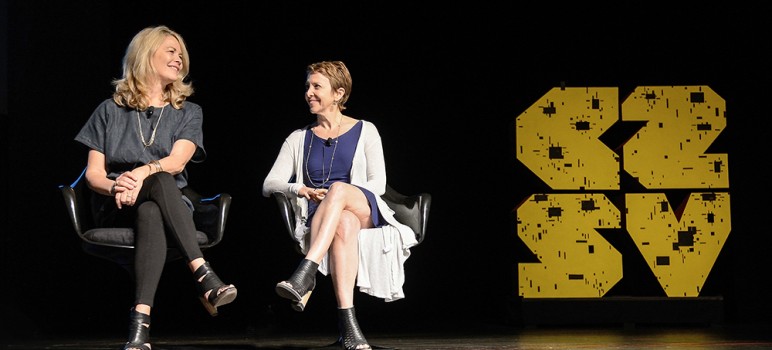

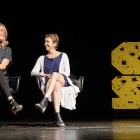
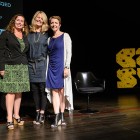
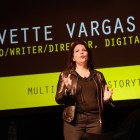

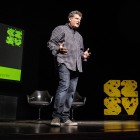
Dear Hillary,
I read this artical, Please fire all the lazy single men with no children and replace with hard working moms with 2 children.
Thanks,
General George C Patton